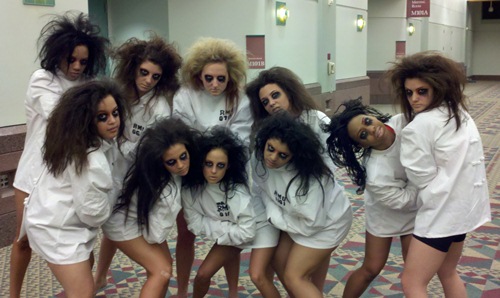When Rose Alberghini, the executive director of NAMI PA York, invited me to speak about barriers to good mental health care, the first obstacle that entered my mind was stigma. The way that the media, especially Hollywood, portrays persons with mental disorders is so crass, cruel and destructive that people are often afraid to acknowledge that they might need help. 
We should not separate the mind from the rest of the body when it comes to illnesses. The heart can get sick and so can the brain. Yet, we insist on viewing mental disorders separate from other physical aliments. Part of the problem, of course, is that we don’t know the biological underpinnings that cause bipolar disorder and schizophrenia. Until we do, there are bound to be arguments. But what we do know is that persons who suffer from mental disorders are rarely portrayed sympathetically.
We would never make a person with Downs Symdrome the butt of a joke. Yet, persons with mental problems continue to be easy targets.
Is it little wonder that when someone begins showing symptoms, they are terrified to seek help?
I decided to begin my speech by showing some examples. I asked my daughter, Traci, who is a senior at Virginia Tech and a psychology major, to compile samples. Sadly, she found dozens and dozens within a few minutes.
At the same time my daughter was putting together a video for me, I received an email from fellow mental health advocate and blogger, Chrisa Hickey. She was the first to alert me several weeks ago about the Waunakee High School dance team’s disgraceful performance in straight jackets. In her email, Chrisa told me that another team had pulled the same offensive stunt. This time it is a team from Robert Morris University. You can read her blog, The Mindstorm: Raising a Mentally Ill Child here. 
College officials there are so clueless that they proudly posted a picture of their team in their “crazy” attire on the campus webpage while bragging about how well the dancers had done. (Please note that in an earlier post, I gave the wrong location for this school, as mentioned in a comment below. I apologize to Robert Morris University in Pittsburgh, especially it’s president, Gregory Dell’Omo. It was my error and I should have been more careful.) The president of the Chicago school is Michael P. Viollt and his email is mviollt@robertmorris.edu I would urge you to complain to him. Given what has happened at Virginia Tech and in Tucson, President Viollt should think about the message that his school is sending to students on his campus who might need help but are fearful of coming forward.
I realize that some readers of this blog believe I am tilting at windmills by constantly writing about the prejudicial portrayal of persons with mental illnesses. But these perceptions are a major contributor to stigma and stigma is what makes it difficult for persons who are ill to be accepted as part of our communities.
I was in Dallas, Texas, last week attending a board meeting of the Corporation for Supportive Housing, which develops creative ways to finance housing for the homeless. Although the Dallas office had come up with three funding plans for innovative projects, weak-kneed elected officials crumbled when local residents protested — saying that they didn’t want homeless persons with mental illnesses as neighbors.
We must fight stigma.
If you still need a reminder of just how prevalent it is, look at this short video that Traci put together for me. The companies behind these ads and portrayals should be ashamed.




Not again! How insensitive!
Thank you for making it so easy to contact the university. With just a click on your blog, I was able to write to the school and make a complaint and encourage the school to get some education about neurobiological illness. I will encourage my colleagues to do so as well. Thank you, Pete.
Hi Pete – one note – this Robert Morris University is in Chicago, IL, not the one in PA. We still have some fine mental health institutions here, and a very vibrant Active Minds chapter at the Art Institute just down the road from Robert Morris.
Love you, but think how much more powerful that first paragraph would be had you used the word ‘discrimination’ instead of stigma. OK. I won’t bring it up again.
Grateful for your voice speaking out on behalf of all those who are afraid to get help or may be afraid one day to get the help they need. If we can bring more attention to this discrimination and stigma that is so pervasive perhaps people will give more thought to their actions before portraying the mentally ill in such barbaric ways.
Much respect,
Amy Kiel
I appreciate the question raised about whether the word “stigma” is less effective than “discrimination.” A possible explanation: we “stigmatize” the other; we experience “discrimination.” That is to say, people with MI — the vast majority of whom are employed and productive members of society — hide their illness because they have experienced discrimination as a result of the stigmatization of their illness. And unfortunately, the statistics show that stigma has increased with the medicalization of MI. Why, who knows. Maybe because what had been viewed as intermittent eccentricity/difficulty in a highly productive colleague is now seen as a permanently and irreparably broken brain.
The Chicago Tribune picked up this story – and got the University’s response: http://bit.ly/hwsNeo
With the constant fear of people with multiple mental illnesses and medical disorders or , as in dual diagnoses, and for those with multiple disorders many people live and work with disorders everyday and live in the community without ever thinking that they may have a small disorder themselves. In essence we are all at least a little bit mentally ill at times in our lives, but many are just not able to agree to it. And we are sometimes even